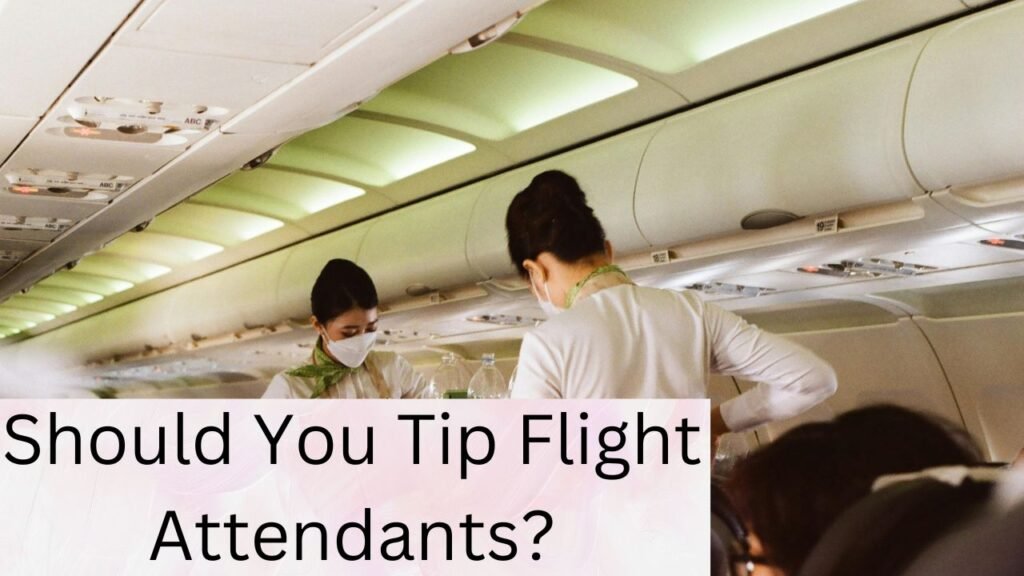The Quick Answer (If You’re in a Hurry)
No, tipping flight attendants is not expected in the United States. Airlines generally discourage it, and it could even cause confusion or awkwardness.
That said, there are some very rare exceptions — especially with low-cost carriers — where small gestures are welcomed under specific situations.
Let’s break it all down, so you know exactly what to do next time you fly.

Why Flight Attendants Are NOT Your Typical Service Workers
Many travelers assume flight attendants are just “sky waiters.”
Truth is, they are trained safety professionals first and foremost.
Here’s what they actually do:
- Respond to medical emergencies (CPR, AED, first aid certified).
- Coordinate aircraft evacuations within 90 seconds.
- Monitor cabin security constantly during flight.
- Enforce FAA regulations and handle in-flight disturbances.
Serving drinks and snacks? That’s just about 10% of their real job.
Keeping you alive? Yeah, that’s 90%.
🔵 Story Moment:
Imagine a sudden cabin decompression at 30,000 feet. In that panic, it’s not the pilots who rush back — it’s the flight attendants handling oxygen masks and protecting passengers.
You’ll be very thankful their training focuses on emergency response, not tips.
What the Airlines Actually Say About Tipping
Here’s a quick table with examples from major US airlines:
| Airline | Official Policy on Tipping |
|---|---|
| American Airlines | Tipping not allowed. Gratuity offers declined. |
| Delta Air Lines | Tipping discouraged. Focus on safety service. |
| United Airlines | No tipping policy; gratuities refused. |
| Southwest Airlines | Accepts “thank you” notes, no cash tips. |
| Frontier Airlines | Tipping allowed via tablet for onboard purchases. |
🔵 Direct Quote Example:
Frontier Airlines even prompts:
Most full-service airlines like Delta, United, and American maintain strict no-tipping policies to protect professionalism and prevent conflict of interest.
How Much Do Flight Attendants Actually Make?
Knowing the salary sheds more light on why tipping isn’t expected.
- Starting salary: Around $28,000–$35,000 per year (source: Bureau of Labor Statistics, 2024).
- Experienced attendants: Up to $80,000+ depending on seniority, airline, and hours flown.
- Average salary: About $62,280 in 2024.
Besides base salary, they also get:
- Per diem allowances (for meals while away from base).
- Overtime and premium pay.
- Travel benefits (discounted or free flights).
Simply put, flight attendants are compensated professionally without relying on tips like waiters or hotel porters.
When (If Ever) Should You Tip a Flight Attendant?
While not necessary, a tip or small gift might be appreciated in some very specific scenarios:
- Extraordinary service like helping manage a medical situation.
- Personal gestures during long delays or bad weather.
- Special occasions like honeymoon flights or milestone celebrations.
🔵 Story Moment:
A traveler once tipped a Southwest flight attendant with a Starbucks gift card after she patiently cared for his sick child on a bumpy cross-country flight. The attendant was shocked and deeply grateful — but politely explained it wasn’t necessary.
If you do want to express thanks:
- Hand-written thank you note
- Gift cards (small, non-cash tokens)
- Verbal compliments (reporting great service to airline after the flight)
These gestures are typically more appropriate than cash.
Why Tipping Can Be Problematic (Ethical Considerations)
Introducing tipping into aviation could cause unintended problems:
- Blurs authority: Passengers might expect “better treatment” in emergencies if they tipped.
- Creates inequality: Some passengers may feel pressured to tip for basic safety tasks.
- Professionalism concerns: Safety decisions should never be influenced by gratuities.
Maintaining a no-tipping norm ensures flight attendants can enforce rules and make judgment calls without bias or hesitation.
Tipping Around the World: Cultural Differences
It’s worth noting: outside the U.S., tipping flight attendants is almost unheard of.
| Region | Tipping Custom |
|---|---|
| Europe | No tipping expected. |
| Asia | No tipping; considered rude. |
| Middle East | Gratitude expressed verbally. |
| Latin America | Tipping rare, but polite gestures welcome. |
If you’re flying internationally, assume no tipping unless specifically told otherwise.
FAQ: Quick Answers to Common Questions
Q1: Is it rude to offer a tip to a flight attendant?
Not rude, but often unnecessary. A sincere thank-you or compliment goes a long way.
Q2: Can I tip flight attendants on Frontier Airlines?
Yes, but only via the inflight purchase system — not cash handouts.
Q3: What’s the best way to thank a flight attendant?
Kind words, a thank-you note, or reporting their service to the airline’s customer feedback line.
Q4: Could tipping compromise flight safety?
Potentially yes, by creating perceived biases or undermining authority.
Conclusion: Here’s What You Should Do
Bottom line:
You don’t need to tip flight attendants. It’s not expected, it’s not required, and in most cases, it’s actively discouraged.
They are highly trained safety professionals, not service staff relying on gratuities to survive.
Want to show appreciation?
- Smile.
- Say thank you.
- Tell the airline when someone did an exceptional job.
Because at 35,000 feet, the biggest “tip” you can give is respect for the people keeping you safe.